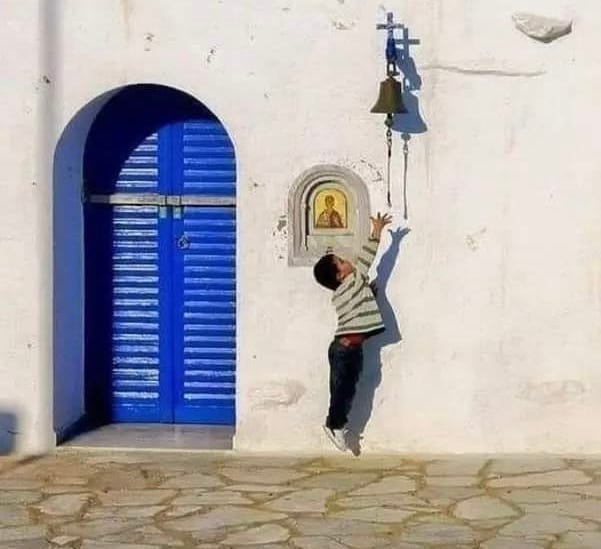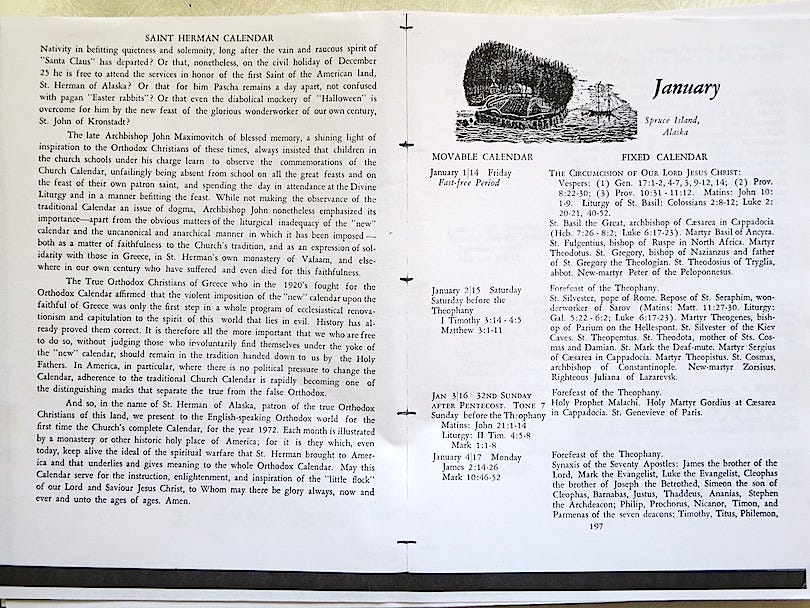An interesting aspect of Orthodoxy that may confuse newcomers and Orthodox alike is the different calendars being used. I seek to give a brief explanation of its history, and the importance and historical witness of the saints maintaining unity despite the use of both. May God have mercy on us all, in the name of the Father, the Son, and the Holy Spirit. Amen.
Before the early 1920’s, Orthodox Christians around the world calculated the Church Calendar by use of the Julian Calendar. It wasn’t until Patriarch Meletius Metaxakis of Constantinople decided to implement a change to the New (Revised Julian) Calendar. He was only patriarch of Constantinople for two years, went quiet for a few years and almost a decade later became Patriarch of Alexandria where he was known for trying to completely ban the role of laity in the elections of leaders such as Patriarchs. This caused severe public backlash as was their strife and controversy for his decision on the New Calendar.
Meletius Metaxakis is listed as a Freemason in the Lodge: "ΑΡΜΟΝΙΑ" (HARMONY). And is the only figure in Orthodox History who was elected Patriarch of three different Sees in his life, Greece, Constantinople, and Alexandria. Those who rightly brought up their concerns wrongly decided to break communion, calling graceless any church that used the New Calendar; and thus the “Old Calendarists” or “True Orthodox” churches were born.
It’s important to note not all of those who use the Old Calendar are “Old Calendarists.” And the Greek government fueled the flames by persecuting Greek Old Calendarist groups, there is merit to some of their arguments but their solutions do not follow. The scope of this article however, is on the Calendar issue itself and our orientation towards it.
Some of those in favor of the New Calendar proclaim it is more accurate, use viable reasoning such as the calendar throughout much of Christian history in the Old Testament varied, and quip that the Old Calendar was imposed by a pagan.
Some of those in favor of the Old Calendar proclaim it is the calendar the Church has always used since the Incarnation, the fact that Orthodoxy still uses the Old Calendar to celebrate Pascha/Lent in accordance with Ecumenical Councils cement it forever in Orthodoxy, and quip that the new calendar was imposed by a Pope and a Freemason.
I am not here to give you a concise reason for or against either side here to turn it even more polemical, I am just reiterating points I have heard both in-person and online regarding the Old and New Calendars. I have personally watched a couple of people buy into the heavy rigorist position and apostatize believing the calendar is a church-dividing issue (or part of) in the sense of worthy of schism. I do not downplay the significance that it is a church governance problem that divides, it should be addressed, but I do push back that it is on the level of a dogmatic problem worthy of breaking communion.
Maintained Communion In The Quartodeciman Controversy
St. Polycarp concelebrated with St. Anicetus maintaining Eucharistic communion despite having two different celebrations of Pascha, our primary sources here are St. Ireneaus and the church historian Eusebius. They disagreed on the time of when the celebration of Pascha should occur, this is part of what is called the Quartodeciman controversy. St. Ireneaus details that despite their disagreements they did not cease communion together.
“But though matters were in this shape, they communed together, and Anicetus conceded the administration of the eucharist in the church to Polycarp, manifestly as a mark of respect. And they parted from each other in peace, both those who observed, and those who did not, maintaining the peace of the whole church.” - Eusebius, Church History Book V, Chapter 24:17.
Decades later the same disagreement remained but a different reaction was given between Pope St. Victor and Polycrates. Pope Victor excommunicated those who held the position of Polycrates and St. Polycarp much to the protest of many bishops including St. Ireneaus who called Pope St. Victor to repent and lift the excommunication.
“Thereupon Victor, who presided over the church at Rome, immediately attempted to cut off from the common unity the parishes of all Asia, with the churches that agreed with them, as heterodox; and he wrote letters and declared all the brethren there wholly excommunicate. But this did not please all the bishops. And they besought him to consider the things of peace, and of neighborly unity and love. Words of theirs are extant, sharply rebuking Victor. Among them was Irenæus.” - Eusebius, Church History Book V, Chapter 24:9-11.
The Church, from the 100’s until 325 with the First Ecumenical Council did not uniformly celebrate the Resurrection on the same day. It’s important to note the Church was heavily persecuted in this same period which added to the issues, but we can easily parallel the early church to today. Old Calendar and New Calendar do not agree on some of the celebrations, feasts, mainly Christmas/Nativity but nevertheless remain in communion. All Orthodox celebrate Lent and Pascha on the same calendar & time using the Old Calendar standard. This is part of the First Ecumenical Council.
Therefore if the saints on both sides of a calendar disagreement did not find it worthy to break communion, we should not either. Like them, it could be an almost 200 year problem that tests our patience, willingness to forgive, but we should stick it out and go through it as family normally does. And as I’ll show by the witness of the modern saints, who bear the same spirit of unity as those in the Quartodeciman controversy, you can perfectly hold the position that the Old Calendar is better in your view and still maintain communion.
Is this a Church dividing issue? What do the saints say?
No. And as with the previous example already given, we have saints who did not advocate for any kind of schism because of the calendars. Such as St. Nicholas Planas of Athens, canonized in 1992; when someone asked him about the controversial calendar issue, St. Nicholas replied, “From conviction, the Old, and from obligation, the New!” In other words, he continued to serve according to the Old Calendar —even if he disagreed with the decision— but he did not leave the New Calendar bishops or advocate for breaking communion.
St. John Maximovitch and inevitable soon-to-be saint Fr. Seraphim Rose both maintain the exact same position. In the September 1971 edition of “The Orthodox Word” Fr. Seraphim writes, “While not making the observance of the traditional Calendar an issue of dogma, Archbishop John nonetheless emphasized its importance.” Both of them did advocate for the Old Calendar, Fr. Seraphim more strongly, but did not deem it a dogma, or a church-dividing issue. This is also how Mt. Athos treats it, the monks there follow the Old Calendar but do not break communion with anyone on the New Calendar.
St. Paisios of Mt. Athos when asked about the calendar said, “It would have been good if this calendar difference did not exist, but it is not a matter of faith. The new calendar was made by a Pope and the old one by an idolater,” meaning of course Julius Caesar. In another conversation with St. Paisios it ended up with the Saint recommending a New Calendar Church with the situation this person was in. It reads as follows:
“St. Paisios: “How many churches do you have there where you live?”
Four, I replied and a new wave of surprise came over me.
St Paisios: With the old or with the new (calendar)?
then came the third “thunderbolt” which, however, instead of increasing my surprise, somehow made me feel more at ease with the Elder’s charisma. Two with the old and two with the new, I replied.
St. Paisios: Which one do you follow?
I with the old, and my wife with the new, I replied.
St. Paisios: “Look. You should go where your wife goes” he told me with firmness.
St. Joseph the Hesychast and Elder Ephraim both have stories about Old Calendarists being wrong in their insistence upon division you can look up as well as I don’t want to drag this article out too much.
Regardless of who is right, beyond the accuracy of the calendars, past if a pagan wrote one or a Pope the other, etc. The central importance here is communion. I believe we are in our own modern form of a Quartodeciman controversy, albeit not identical, parallels the same issue. The disciple of St. John the Theologian, St. Polycarp, was found to be on the wrong side of this issue. And as in the early church controversy, saints are found on both sides of the dispute. Hopefully we can learn from the same resolve and solution as the saints before us as well as the modern saints now who profess love, and unification. The answer is unity amidst disagreement, time, prayer, and most of all calling upon God’s help. Without Him we can do nothing.
Sources:
“Life of the Elder Paisios the Athonite” (in Greek) by Hieromonk Father Isaak (pages 691-696).
Elder Ephraim of Katounakia: Obedience Is Life, by Holy Hesychasterion "St. Ephraim", Katounakia, Mount Athos; p.56.
Fr. Seraphim Rose. The Orthodox Word, Vol. 7. St. Herman of Alaska Brotherhood, 1971.
Eusebius of Caesarea, Church History Book V, Chapter 24:9-11. Penguin Classics.







I agree we should 'live and let live' when it comes to which calendar. Peace between brothers and sisters in Christ is paramount. I also notice that certain annual miracles happen on the Old Calendar. The cloud over Mt. Tabor each year falls on the Old Calendar Feast of the Transfiguration and Holy Fire at Pascha. But there are New Calendar miracles as well, like the Jordan River flowing backwards during the service of Theophany which was held on the Gregorian date.
We are directed by the holy Fathers to flee heresy. You should do more research on the True Orthodox and understand that they are not just leaving communion because of the calendar. You need to research your bishop's involvement in the World Council of Churches. Read St Philaret's Sorrowful epistles. Read Russia's Catacomb Saints and learn more about Sergianism. If you are in communion with the MP you are a part of this mess. When you tell newcomers that they don't need to worry about these issues or that they are "rigorist" for following Christ and his saints, you are part of the problem.